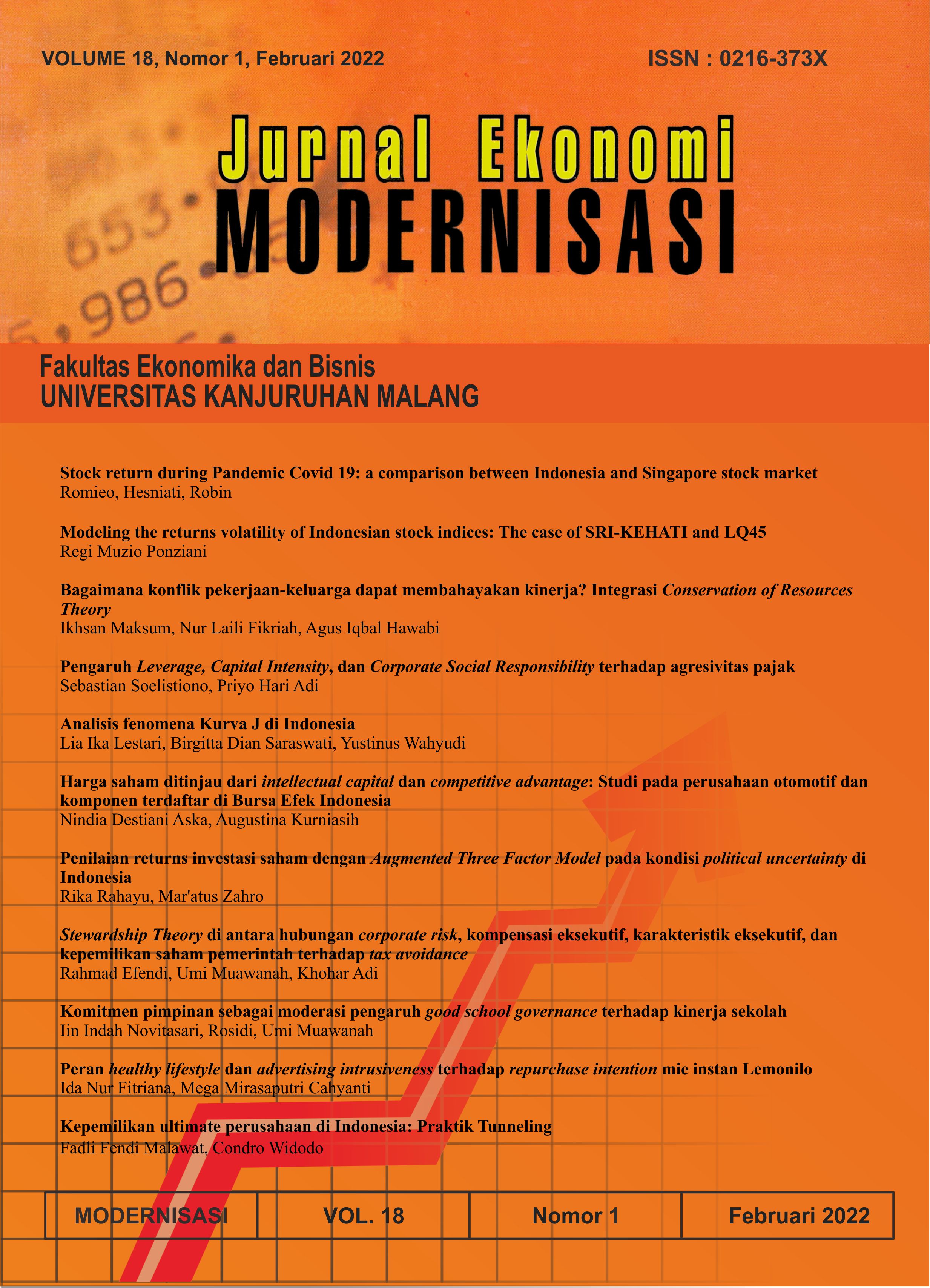Stewardship Theory di antara hubungan corporate risk, kompensasi eksekutif, karakteristik eksekutif, dan kepemilikan saham pemerintah terhadap tax avoidance
Main Article Content
Abstract
This research expected to understand the effect of corporate risk as measured by the standard deviation of EBITDA divided by total assets, executive compensation, executive characteristics as proxied by age and executive education and government share ownership on tax avoidance (ETR). The research sample of state-owned enterprises found on the official website bumn.go.id, was selected using the purposive sampling method, and 31 state-owned enterprises were obtained as observation data that met the sample criteria. The analysis to examine the effect of each independent variable on the dependent uses Multiple Regression. The results of the study state that corporate risk has a significant influence on tax avoidance, however, the results of this research are different when the researcher tries to exclude state-owned companies that are subject to final income tax from the research sample. From the results of this study, it was found that corporate risk has no effect on tax avoidance. executive compensation, executive characteristics of government share ownership have no effect on tax avoidance. Further research can use financial ratios, company age or other proxies that may affect tax avoidance. In addition, future researchers are expected to use private companies as a comparison of tax avoidance practices.
Downloads
Article Details
Authors who submit a manuscript understand that if the manuscript is accepted for publication, the copyright of the article shall be assigned to Jurnal Ekonomi Modernisasi (JEM).
References
A.Desai, M., & Dharmapala, D. (2006). Corporate tax avoidance and high-powered incentives. Journal of Financial Economics, 79(1), 145–179. https://doi.org/10.1016/j.jfineco.2005.02.002
Armstrong, C. S., Blouin, J. L., & Larcker, D. F. (2012). The incentives for tax planning. Journal of Accounting and Economics, 53(1–2), 391–411. https://doi.org/10.1016/j.jacceco.2011.04.001
Bradshaw, M., Liao, G., & Ma, M. S. (2019). Agency costs and tax planning when the government is a major shareholder. Journal of Accounting and Economics, 67(2–3), 255–277. https://doi.org/10.1016/j.jacceco.2018.10.002
Budiman, J. (2012). Pengaruh karakter eksekutif terhadap penghindaran pajak (Tax avoidance). Simposium Nasional Akuntansi.
Desai, M. A., & Dharmapala, D. (2006). Corporate tax avoidance and high-powered incentives. Journal of Financial Economics, 79(1), 145–179. https://doi.org/10.1016/j.jfineco.2005.02.002
Dewi, G. A. P., & Sari, M. M. R. (2015). Pengaruh insentif eksekutif, corporate risk dan corporate governance pada tax avoidance. E-Jurnal Akuntansi Universitas Udayana, 13(1), 50–67.
Donalson, L., & Davis, J. F. (1991). Manajemen Keuangan. Jakarta: Salemba Empat.
Dyreng, S. D., Hanlon, M., & Maydew, E. L. (2008). Longâ€Run Corporate Tax Avoidance. The Accounting Review, 83(1), 61–82. https://doi.org/10.2308/accr.2008.83.1.61
Ghozali, I. (2016). Aplikasi Analisis Multivariete dengan Program IBM SPSS 23, Edisi Delapan. Penerbit Universitas Diponogoro. Semarang.
Hanafi, U., & Harto, P. (2014). Analisis pengaruh kompensasi eksekutif, kepemilikan saham eksekutif dan preferensi risiko eksekutif terhadap penghindaran pajak perusahaan. Diponegoro Journal of Accounting, 3(2), 1162–1172.
Haryani, E., Zirman, Z., & Mayangsari, C. (2015). Pengaruh Kompensasi Eksekutif, Kepemilikan Saham Eksekutif, Preferensi Risiko Eksekutif dan Leverage terhadap Penghindaran Pajak (Tax Avoidance). In Disertasi. Riau University.
Irawan, H. P., & Farahmita, A. (2012). Pengaruh Kompensasi Manajemen dan Corporate Governance Terhadap Manajemen Pajak Perusahaan. Simposium Nasional Akuntansi.
Jackson, B. R., & Milliron, V. C. (1986). Tax compliance research: Findings, problems, and prospects. Journal of Accounting Literature, 5(1), 125–165.
Lewis, A. (1982). The social psychology of taxation. British Journal of Social Psychology, 21(2), 151–158. https://doi.org/10.1111/j.2044-8309.1982.tb00523.x
Maharani, I. G. A. C., & Suardana, K. A. (2014). Pengaruh corporate governance, profitabilitas dan karakteristik eksekutif pada tax avoidance perusahaan manufaktur. E-Jurnal Akuntansi Universitas Udayana, 9(2), 525–539.
Mamun, A. Al, Entebang, H., Mansor, S. A., Yasser, Q. R., & Nathan, T. M. (2014). The impact of demographic factors on tax compliance attitude and behavior in Malaysia. Journal of Finance, Accounting and Management, 5(1), 109–124.
Muawanah, U., & Indriantoro, N. (2001). Perilaku auditor dalam situasi konflik audit: peran locus of control, komitmen profesi dan kesadaran etis. The Indonesian Journal of Accounting Research, 4(2). https://doi.org/10.33312/ijar.55
Nugraha, M. I., & Mulyani, S. D. (2019). Peran leverage sebagai pemediasi pengaruh karakter eksekutif, kompensasi eksekutif, capital intensity, dan sales growth terhadap tax avoidance. Jurnal Akuntansi Trisakti, 6(2), 301–324. https://doi.org/10.25105/jat.v6i2.5575
Oktamawati, M. (2017). Pengaruh karakter eksekutif, komite audit, ukuran perusahaan, leverage, pertumbuhan penjualan, dan profitabilitas terhadap tax avoidance. Jurnal Akuntansi Bisnis, 15(1), 23–40. https://doi.org/10.24167/jab.v15i1.1349
Paligorova, T. (2010). Corporate risk taking and ownership structure. Bank of Canada Working Paper.
Puspita, S. R., & Harto, P. (2014). Pengaruh tata kelola perusahaan terhadap penghindaran pajak. Diponegoro Journal of Accounting, 3(2), 1077–1089.
Rusydi, M. K., & Martani, D. (2014). Pengaruh struktur kepemilikan terhadap aggressive tax avoidance. Simposium Nasional Akuntansi, 17(1–39).
Song, Y., & Yarbrough, T. E. (1978). Tax ethics and taxpayer attitudes: A survey. Public Administration Review, 442–452.
Torgler, B., & Schaltegger, C. A. (2005). Tax morale and fiscal policy. CREMA Working Paper.
Torgler, B., & Valev, N. T. (2006). Corruption and age. Journal of Bioeconomics, 8(2), 133–145. https://doi.org/10.1007/s10818-006-9003-0
Zhang, H. (2012). How does state owernership effect tax avoidance?evidance from China. Singapore Management Univercity.
